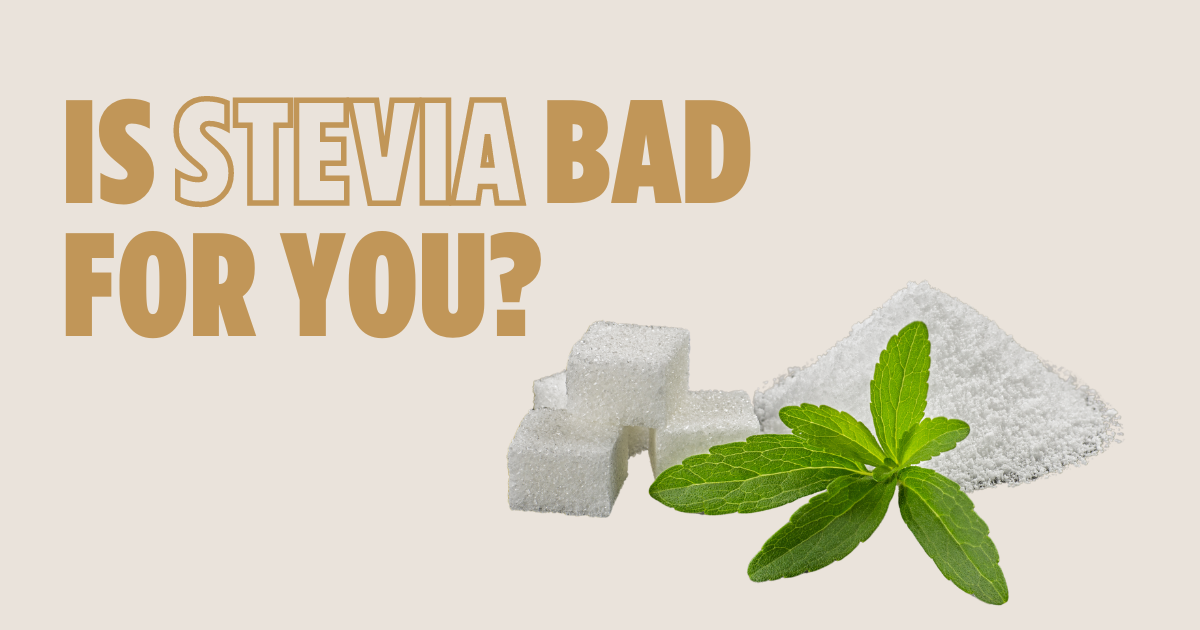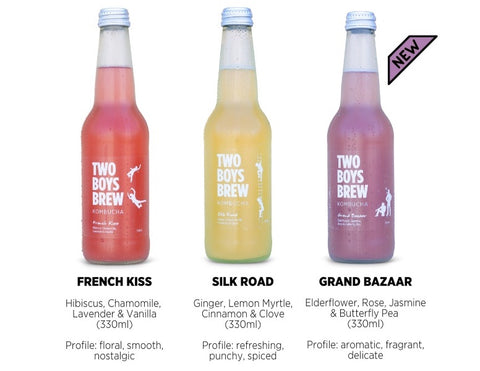
IS STEVIA BAD FOR YOU?
TLDR: The jury is still out on the effects of Stevia on overall health, and it's a definite no-no for real kombucha.
It’s a great question and one we get asked a lot.
Before we look into that, it’s probably best to first look at what is Stevia?
Stevia is a sugar substitute derived from Stevia plants. According to Food Insight, “Stevia sweeteners are made by extracting steviol glycosides from the leaves of the stevia plant and purifying them to remove some of the bitter attributes found in the crude extract.”
Comes from a plant, must be good, right?
Unfortunately, it's not that simple.
The Stevia found in commercial food and beverages is considered an industrial ingredient, a substance that falls into the category of ultra processed foods.
We’re hearing lots of chat about Stevia in the drinks space, and as an authentic booch brand, we are concerned about its use in kombucha.
Because real kombucha needs a small amount of real sugar to remain in each bottle so that the cultures of naturally occurring probiotics can stay alive.
The kombucha process goes a little like this:
SCOBY eats sugar. SCOBY gets strong.
SCOBY makes probiotics, amino acids, vitamins and antioxidants.
You drink kombucha. Your gut and skin is happy.
So if real kombucha needs a little bit of real sugar, why would brands use Stevia instead? Because consumers have been trained to believe that NO SUGAR is always the healthier option. Unfortunately, in the case of kombucha, it’s just not true.
No residual sugar in your booch means that there’s nothing to keep the kombucha alive and healthy.
Aside from promoting a NO SUGAR message, Stevia is often used by kombucha brands who have pasteurised (and consequently killed off all the live probiotics) or over brewed their kombucha (leaving nothing left to ferment) because they want to be able to sell a shelf stable product (cheaper for businesses to transport, store etc). Sometimes brands will add in lab probiotics after brewing so they can still claim to be kombucha.
Either way, a kombucha that has no sugar in it is a sub par product.
This goes for all of Stevia’s buddies as well, such as Erythritol and Xylitol, and it’s worth knowing that some brands are also creating new names for a combination of these sweeteners.
It’s pretty easy though, if the ingredients list doesn’t say sugar but does have either a name you can’t pronounce, or something listed as a “natural sweetener”, it’s likely either one or a combination of these guys.
Aside from the negative implications of using it as a sugar substitute in kombucha, there are increasing questions around the Stevia side effects that may occur from consuming beverages containing the ‘Stevia sugar’.
Some important health bodies in Australia are starting to discuss the broader health implications of Stevia in drinks.
In an Application Report on Addition of steviol glycosides to fruit drinks through Food Standards Australia New Zealand (FSANZ), whilst supporting the application, Dieticians Association of Australia (DAA) raised the following concerns with the Food Standards body:
“(DAA) Recommend that FSANZ continue to review the evidence on long-term safety of artificial sweeteners to ensure consumption of these are not causing potential long term harm to consumers.”
What does this mean? At the moment FSANZ reports on the safety of Stevia as an isolated ingredient for consumption. Which is pretty much like saying, “If I put this in my mouth, will it kill me?”.
What the DAA are suggesting in this recommendation is that the relationship between consumption of Stevia and it’s interaction with the body relating to metabolism, is not so simple.
When we consume something, our brain tells our body to start a whole bunch of functions relating to digestion and our metabolism. Our brain assumes that food/energy is incoming which will require digestion, absorption etc.
However, when the body consumes a non-nutritive sweetener such as Stevia, (non-nutritive meaning that it provides no nutrition to the body) there is nothing for the body to consume and metabolise.
Dieticians Australia said this,
“DAA are aware of a growing body of evidence that artificial sweeteners may have unwanted metabolic effects.”
“DAA recommend ongoing public awareness and education on effects of sweeteners so consumers can make informed choices.”
Queensland Health submitted the following objection to the FSANZ report,
“Permitting artificial sweeteners does not align with Food Regulation system priorities for 2017-2021 on reducing chronic disease related to overweight and obesity. It reinforces consumer preference for sweet foods, rather than positive behaviour change to less sweet foods.”
Unsurprisingly, those supporting the application for the use of Stevia in beverages included some big hitters such as Frucor Suntory who own V drinks and Pepsi, along with the International Stevia Council.
If you’re into this kind of stuff, you can read the FSANZ full report here:
The other thing that you may have noticed about products that contain Stevia, Erythritol or Xylitol is that they leave a really weird aftertaste in your mouth. That’s because they bind to your taste receptors.
Now, we’re not here to claim that Stevia (and co) are definitely good or bad. We believe that the jury is absolutely still out on that, and only time will tell as more research is done.
We ARE here to say that we’ll never use them.
Because as a craft kombucha brand, it’s so important to us that people are clear on what they are purchasing and subsequently putting into their bodies.
We will never compromise on the product we offer and continue to be transparent about what goes into the products we make.
If you want to be sure that you are drinking a pure, real, authentic kombucha that’s full of all the gut and skin loving benefits you’d expect, better drink Two Boys Brew.


